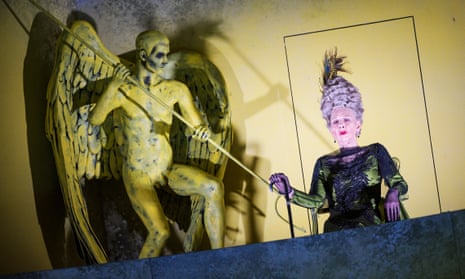The embattled English National Opera company (ENO) has been given more time to get its house in order by the public funding body Arts Council England.
ENO was cut from the national portfolio last February and placed “under special monitoring arrangements” after a series of management crises.
On Monday the company was told it would not be invited back in the current funding period, which runs until April 2018, but it would receive public funding of £12.38m in 2017/18.
The Colchester art gallery Firstsite, which lost its national portfolio place at the same time, has been given similar treatment.
Darren Henley, chief executive of Arts Council England (ACE), said: “Both organisations are making good progress in addressing their respective challenges, but there is more to do if both ENO and Firstsite are to become resilient enough to thrive artistically and economically in future.”
ENO has lost its top tier of management – a chairman, executive director and artistic director – in the space of a year.
The London-based company welcomed the funding decision. Harry Brunjes, the current ENO chairman, said: “We are very happy that Arts Council England have confirmed our third year of funding. We continue to work closely together to ensure the continued financial stability of ENO.
“Our recent appointments to the board and executive management team demonstrate the steps the company is taking to strengthen governance and significant work has taken place over the past year to ensure the continued financial stability of ENO.
“We are working hard to meet the long-term challenge to ensure that ENO is able to continue to produce artistic work of the highest quality whilst remaining financially stable.”
The appointment of a new CEO, Cressida Pollock, a former McKinsey management consultant, has helped steady the ship at a company that has been no stranger to financial and management crises over the decades. One of its biggest challenges remains the sheer size of its venue: the 2,350-seatColiseum is the West End’s biggest theatre.
The ENO was the biggest loser in the 2014 funding round when ACE cut its annual investment by £5m, or 15%.
Pollock recently outlined a five-year plan to get the company operating successfully with 35% of its income from the public purse instead of 50%. She was relaxed about not being in the national portfolio; she said it would return “when the time was right”.
Firstsite is one of the UK’s newest galleries. Since its £28m building opened in 2011 – several years late and over budget – it has struggled to connect with audiences and has lost money.
ACE praised the “substantial progress” made in improving the gallery’s business operations, and promised funding of £814,512 a year.
Henley said: “The Arts Council’s role is to ensure that we get the best value for the taxpayer’s money by investing in well-run companies who delight audiences with brilliant work.
“Both ENO and Firstsite are capable of extraordinary artistic work, and we look forward to seeing further improvements in the governance and business models of both organisations.”

Comments (…)
Sign in or create your Guardian account to join the discussion